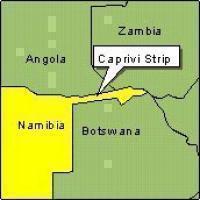







|
News and Information
Defence lawyers zero in on treason witness's 'mistakes'
| November 8, 2005 |

* WERNER MENGES
THE defence assault on the testimony of the tenth prosecution witness in the main Caprivi high treason trial started in the High Court in Windhoek yesterday.
By the end of the first day, one encompassing question may remain unanswered before Judge Elton Hoff.
The question: Could - and would - his testimony be believed after he himself admitted he had not only made factual mistakes in his evidence so far, but that he is also vengeful and has an axe to grind with people he said had been involved with him in the activities of a secessionist movement in the Caprivi Region? Defence counsel Christopher Dube kicked off the cross-questioning by confirming with him that he had previously told the court that he was now 37 years old.
That would mean that he was about 15 years old in 1983 - which was the year he has told the court he had performed national military service in the then South West African defence force.
Within the first half hour of his cross-examination, Dube had already confronted the witness with this apparent anomaly in his testimony - something that the witness tried to explain away by stating that the then SWA Territory Force would even admit students to its ranks.
Dube also pointed out that the witness had told the court last week that he had never received military training.
That last bit was a mistake on his part, the witness answered.
Another alteration emerged soon after that.
The witness told the court that he had heard in 1985 already about suggestions that the Caprivi Region should secede.
He had previously told the court that the first time he heard of the secessionist idea was in 1989.
One of the first questions that defence lawyer Jonathan Samukange asked the witness was whether the mistake about not having received military training was the only one the witness had made.
"There was no mistake apart from that one," the witness said, taking the bait that the lawyer had thrown out for him.
Samukange proceeded to elicit admissions from the witness that he had also made mistakes with two dates.
With his evidence having been heavily laden with dates when he said meetings to discuss and organise the secessionist plan took place, this admission of fallibility may yet turn out to be a concession that the defence could try to milk for all that it is worth.
The witness acknowledged that he had made a mistake both when he told the court that it was in 1998 when he again left the Dukwe refugee camp in Botswana, where he said he and fellow Caprivi Region residents had gone in late 1998 to prepare for an armed separatist campaign in the region, and that Namibia's then Minister of Home Affairs, Jerry Ekandjo, had visited Dukwe in 1998 to tell the Namibians there that they could return to Namibia without fear.
Both events actually took place in 1999, he said.
Samukange reserved some of his most cutting comments for the witness for questioning over the reasons the witness said he gave to the Botswana authorities when he and his companions were asked why they had left Namibia in late 1998.
They had been informed that they would receive military training in Botswana, but that was not what they told that country's authorities, he told the court.
Instead, he told Botswana officials and officials of the United Nations High Commissioner for Refugees in Botswana that he had fled because of persecution in Namibia, he testified.
As he put it, he had told them that "our cousins back home were killing us", and that these "cousins" were "the Wambos".
Those reasons were not true, he also told the court.
"You deliberately tarnished the image of the Government of Namibia.
You did it deliberately," Samukange told him yesterday.
"Yes, we did, it, and we knew that, because we knew what our interest was," the witness replied.
"You were also aware that these lies you were peddling would be circulated to the international community," Samukange followed on.
Yes, they were circulated to the international community, the witness answered.
"And you were aware that the international community would denote Namibia as a country that does not respect human rights," Samukange added.
Again the witness confirmed what the lawyer had said.
"But you nevertheless persisted in telling these lies," Samukange pressed on.
"Yes, but even as you are standing there, you are telling lies," the witness tried to counter.
Samukange went on to suggest to him that he was vengeful because at Dukwe his fellow exiles from the Caprivi Region were accusing him of being a spy in their midst.
The witness agreed that he was vengeful.
He also agreed with a statement from Samukange that he was a witness in the trial because he had an axe to grind with other former comrades in the secessionist movement.
Samukange is set to continue with his cross-examination when the trial continues today - the 61st day of proceedings in the trial, and the 11th day that the witness will be in the witness box |
Source: www.namibian.com.na |
| http://www.namibian.com.na/ |
|
| Support Caprivi Freedom |
Fill out the form below to become a member of this site and receive our regular newsletter.
|

|

